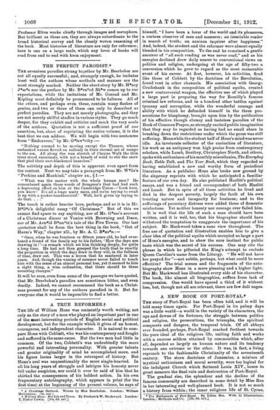A TRUE REFORMER.t
THE life of William Hone was eminently worth writing, not only as the story of a man who played an important part in one of the moat interesting periods of English social and political development, but for the example which it gives of an honest, courageous, and independent character. It is natural to com- pare Hone with Cobbett, who was his contemporary and fought and suffered in the same cause. But the two men had little in common. Of the two, Cobbett's was undoubtedly the more powerful and interesting personality. With greater talents and greater originality of mind he accomplished more, and his figure looms larger in the retrospect of history. But Hone's zeal was unquestionably the more single-hearted. In all his long years of struggle and intrigue his honesty never fell under suspicion, nor could it ever be said of him that he shirked the consequences of his boldest action. In his own fragmentary autobiography, which appears in print (for the first time) at the beginning of the present volume, he says of • A Christmas Garland. Woven by Max Beerbohm. London: William Heinemann. [5s. net. J t William Hone : His Life and Times. By Frederick W. Hackwood. London: T, Fisher Unwin. [10s, 6d. net.] himself, "I have heen a lover of the world and its pleasures; a curious observer of men and manners ; an insatiable reader in search of truth; an anxious inquirer after happiness." And, indeed, the student and the reformer were almost equally blended in his composition. To the end he remained a gentle amateur of " all such reading as was never read," and as his energies declined drew daily nearer to conventional views on politics and religion, undergoing at the age of fifty-two a conversion which he grew to regard as the most memorable event of his career. At first, however, his activities, fired like those of Cobbett by the doctrines of the Revolution, found vent in other channels. His association with George Cruikshank in the composition of political squibs, created a new controversial weapon, the effective use of which played a large part in preparing the way for Hominy's famous criminal law reforms, and in a hundred other battles against' tyranny and corruption, while the wonderful courage and ability with which he defended himself in the three pro- secutions for blasphemy, brought upon him by the publication of his effective though clumsy and tasteless parodies of the Book of Common Prayer, so strongly excited public imagination that they may be regarded as having bad no small share in breaking down the restrictions under which the press was still suffering. Meanwhile the student half of Hone's mind was never idle. An inveterate collector of the curiosities of 'literature, his work as an antiquary won high praise from contemporary scholars, while Lamb, Southey, Christopher North, and others, spoke with enthusiasm of his monthly miscellanies, TheEveryday Book, Table Talk, and The Year Book, which they regarded as having established a new and worthy form of periodical literature. As a publislue Hone also broke new ground by the sixpenny reprints with which he anticipated a familiar feature of our own day. He also published Hazlitt's political essays, and was a friend and corresponden':, of both Hazlitt and Lamb. But in spite of all these activities he lived and died in the deepest poverty, largely the fault of his own trusting nature and incapacity for business ; and to the sufferings of pecuniary distress were added those of domestic misfortune. Yet neither honesty nor courage ever failed him.
It is well that the life of such a man should have been written, and it is well, too, that his biographer should have withstood the temptation to exaggerate the importance of his subject. Mr. Hackwood takes a sane view throughout. The free use of quotation and illustration enables him to give a clear idea of the political squibs which occupied so large a part of Hone's energies, and to show the sure instinct for public taste which was the secret of his success. One may cite the phrase in which he pilloried the King's attempt to exclude Queen Caroline's name from the Liturgy. " He will not have her prayed for "—not subtle, perhaps, but what could be more effective? The trial scenes and the fragments of the auto- biography show Hone in a more pleasing and a higher light. But Mr. Hackwood has illustrated every side of his character. The book, like almost all biographies, suffers from lack of compression. One would have spared a third of it without loss, but, though not all are relevant, there are few dull pages.










































 Previous page
Previous page